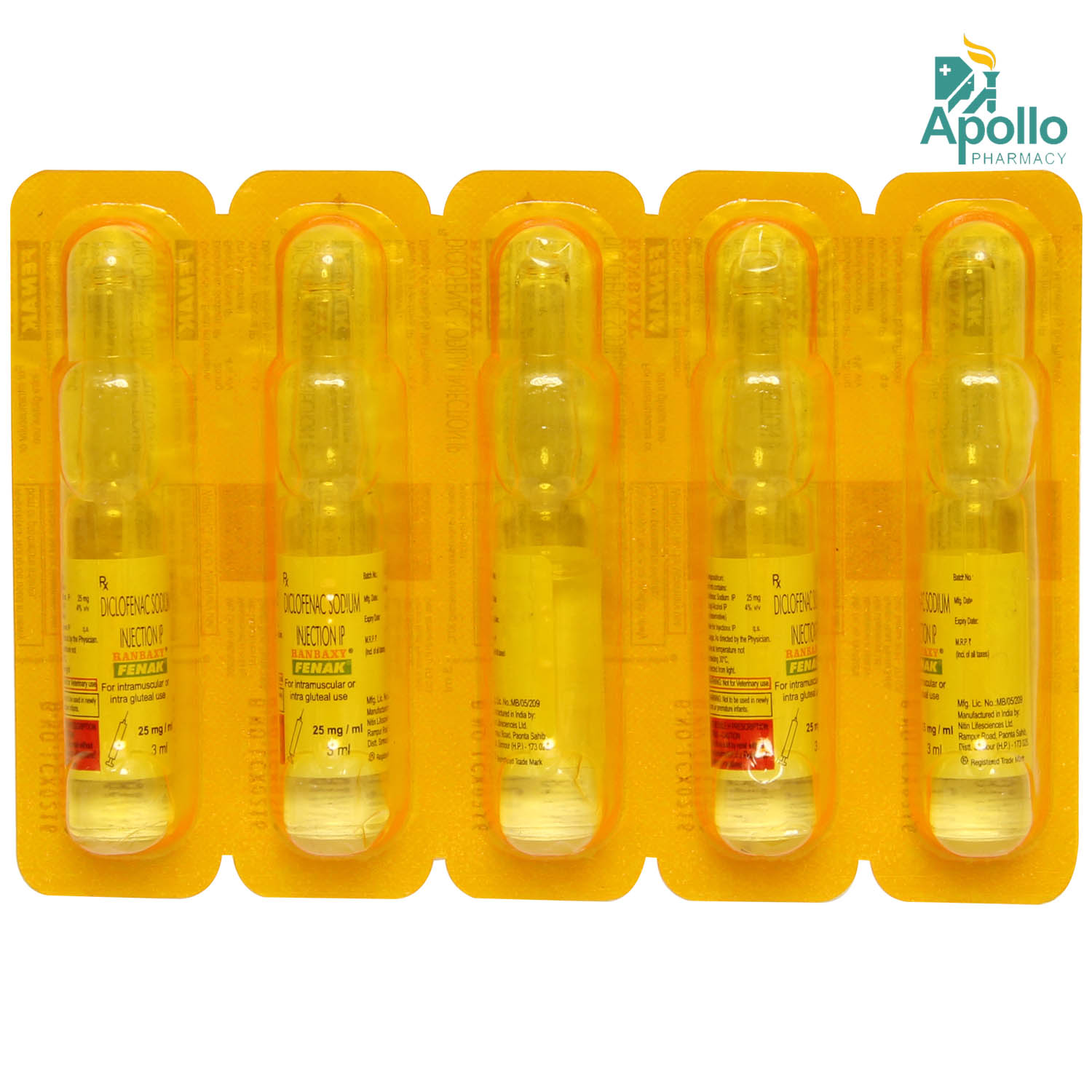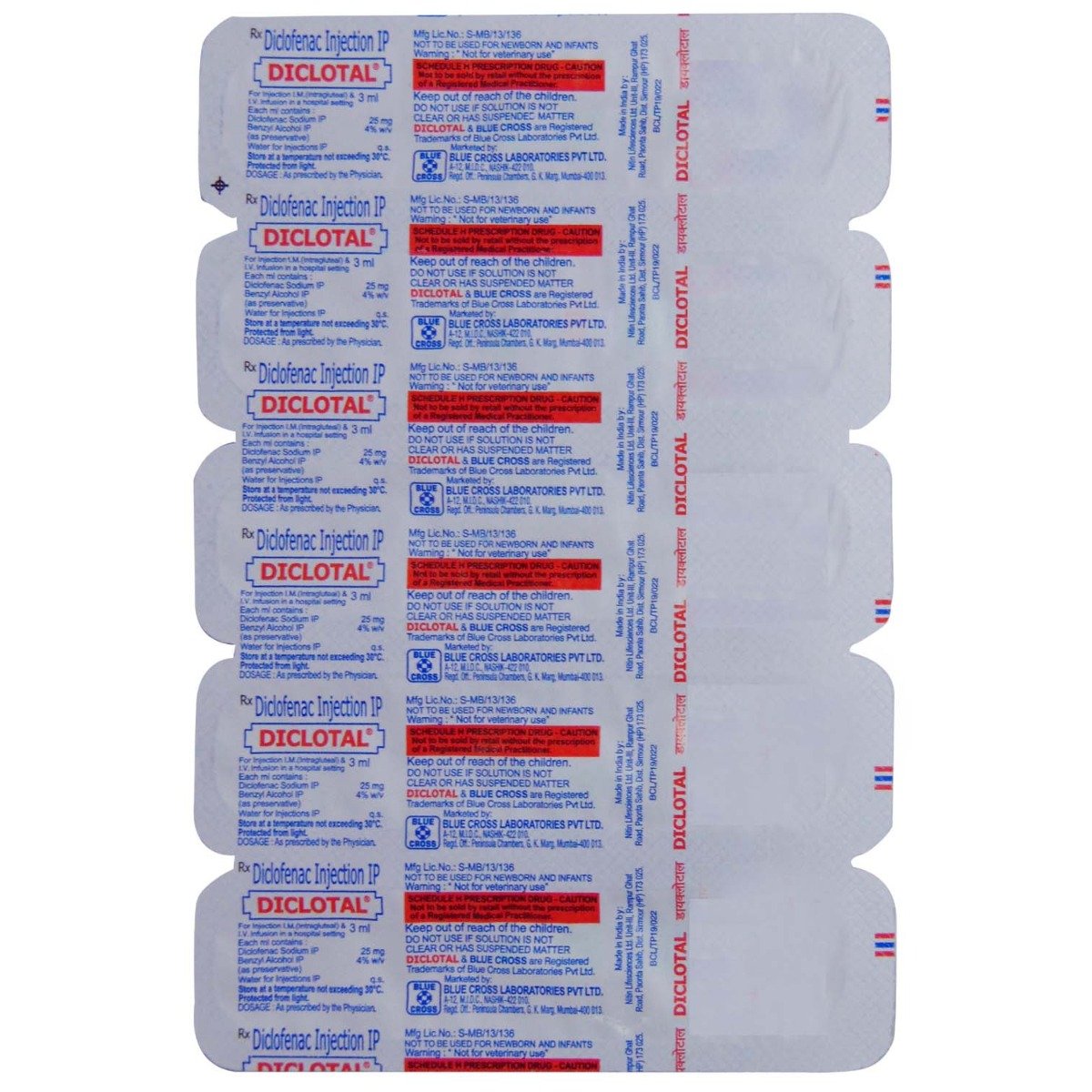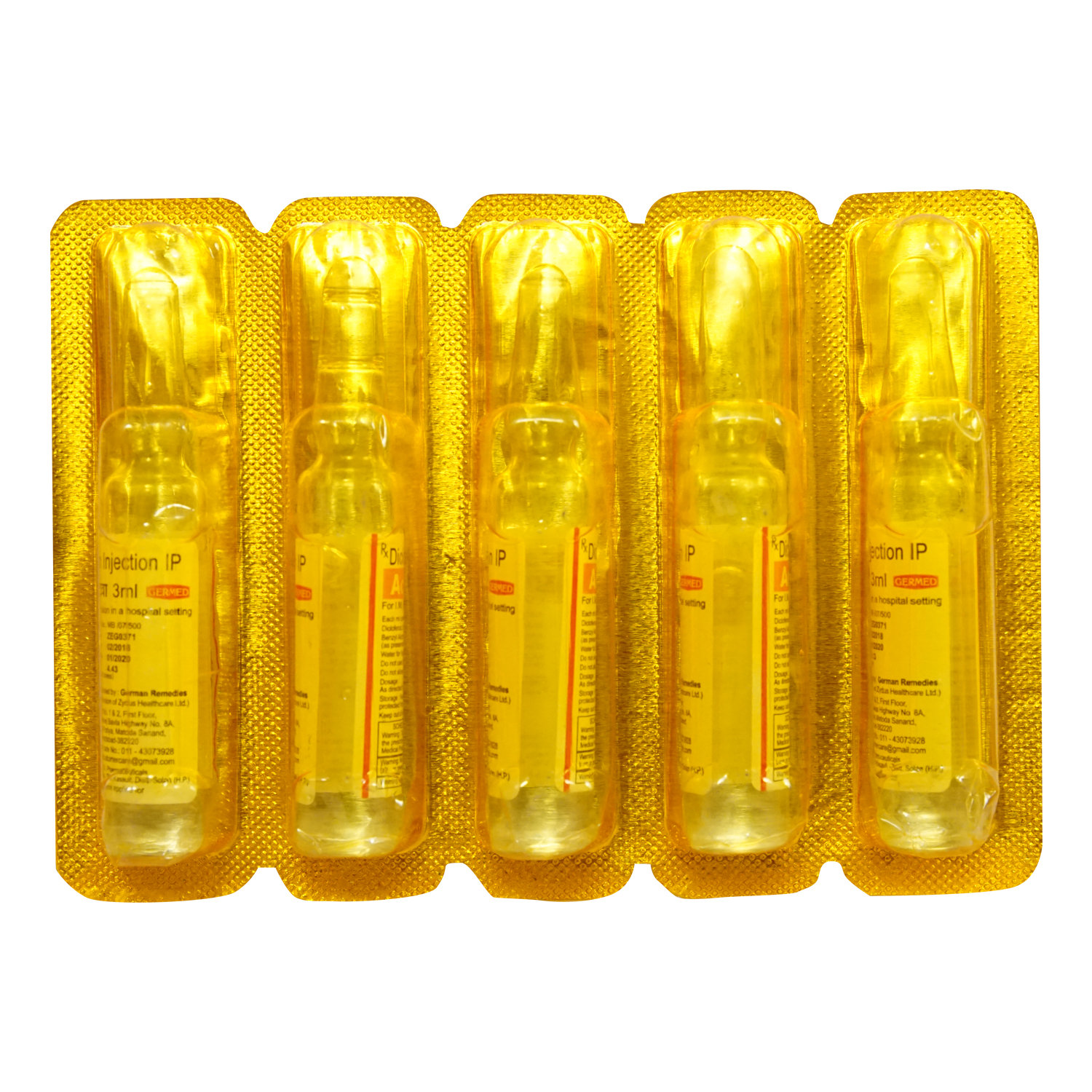Diclonac Injection 3 ml
MRP ₹19.5
(Inclusive of all Taxes)
₹2.9 Cashback (15%)
Provide Delivery Location
Online payment accepted
 Prescription drug
Prescription drugWhats That
Composition :
Manufacturer/Marketer :
Consume Type :
Expires on or after :
Return Policy :
About Diclonac Injection 3 ml
Diclonac Injection 3 ml belongs to a group of medicines called Non-Steroidal Anti-Inflammatory Drugs (NSAID) used to relieve pain in conditions such as flare-ups of joint and back pain, attacks of gout, pain caused by gall stones, kidney stones, injuries, trauma, fractures and pain following surgery.
Diclonac Injection 3 ml contains ‘Diclofenac’, which works by inhibiting the synthesis of certain chemical messengers which are responsible for causing pain and inflammation. Thereby, Diclonac Injection 3 ml helps provide relief from pain.
Diclonac Injection 3 ml may cause common side effects such as stomach pain, nausea, vomiting, heartburn, and injection site reactions. Most of these side effects do not require medical attention and will resolve gradually over time. However, you are advised to talk to your doctor if the side effects persist or worsen.
Diclonac Injection 3 ml is not recommended during the last three months of pregnancy and for children. Inform your doctor if you are pregnant or breastfeeding before receiving this injection. Keep your doctor informed about your health condition and ongoing medicines to rule out any side effects/interactions.
Uses of Diclonac Injection 3 ml
Directions for Use
Key Benefits
Diclonac Injection 3 ml belongs to a group of medicines called Non-Steroidal Anti-Inflammatory Drugs (NSAID) used to relieve pain in conditions such as flare-ups of joint and back pain, attacks of gout, pain caused by gall stones, kidney stones, injuries, trauma, fractures and pain following surgery. Diclonac Injection 3 ml contains ‘Diclofenac’, which works by inhibiting the synthesis of certain chemical messengers responsible for causing pain and inflammation. Thereby, Diclonac Injection 3 ml helps provide relief from pain.
Storage
- Inform your doctor about the nausea and discuss possible alternatives to the medication or adjustments to the dosage.
- Divide your daily food intake into smaller, more frequent meals to reduce nausea.
- Opt for bland, easily digestible foods like crackers, toast, plain rice, bananas, and applesauce.
- Avoid certain foods that can trigger nausea, such as fatty, greasy, spicy, and smelly foods.
- Drink plenty of fluids, such as water, clear broth, or electrolyte-rich beverages like coconut water or sports drinks.
- Use ginger (tea, ale, or candies) to help relieve nausea.
- Get adequate rest and also avoid strenuous activities that can worsen nausea.
- Talk to your doctor about taking anti-nausea medication if your nausea is severe.
- Record when your nausea occurs, what triggers it, and what provides relief to help you identify patterns and manage your symptoms more effectively.
- Inform your doctor about your constipation symptoms. They may adjust your medication or advise alternative treatments.
- Stay hydrated by drinking sufficient of water (at least 8-10 glasses a day) to help soften stool and promote bowel movements.
- Increase fibre intake by eating foods high in fibre, such as fruits, whole grains, vegetables and legumes, to help bulk up the stool.
- Establish a bowel routine by trying to go to the bathroom at the same time each day to train your bowels.
- Engaging in regular exercise, like walking or yoga, can support in bowel movement stimulation.
- Consult your doctor if constipation persists, and discuss alternative treatments or adjustments to your medication.
- Report the itching to your doctor immediately; they may need to change your medication or dosage.
- Use a cool, damp cloth on the itchy area to help soothe and calm the skin, reducing itching and inflammation.
- Keep your skin hydrated and healthy with gentle, fragrance-free moisturizers.
- Try not to scratch, as this can worsen the itching and irritate your skin.
- If your doctor prescribes, you can take oral medications or apply topical creams or ointments to help relieve itching.
- Track your itching symptoms and follow your doctor's guidance to adjust your treatment plan if needed. If the itching persists, consult your doctor for further advice.
- Skin rash caused by allergies is due to irritants or allergens. Therefore, avoid contact with such irritants.
- Consult your doctor for proper medication and apply an anti-itch medication. Follow the schedule and use the medication whenever needed.
- Protect your skin from extreme heat and try to apply wet compresses.
- Soak in the cool bath, which gives a soothing impact to the affected area.
- Include iron-rich foods like dark leafy vegetables, lean red meat, legumes and fish in your diet.
- Consume vitamin C-rich foods as they aid iron absorption.
- Limit tea, cocoa, and coffee as these can slow iron absorption.
- Exercise regularly; however, do not overdo it.
- Inform your doctor about dizziness symptoms. They may adjust your medication regimen or prescribe additional medications to manage symptoms.
- Follow your doctor's instructions for taking medication, and take it at the same time every day to minimize dizziness.
- When standing up, do so slowly and carefully to avoid sudden dizziness.
- Avoid making sudden movements, such as turning or bending quickly, which can exacerbate dizziness.
- Drink plenty of water throughout the day to stay hydrated and help alleviate dizziness symptoms.
- If you're feeling dizzy, sit or lie down and rest until the dizziness passes.
- Track when dizziness occurs and any factors that may trigger it, and share this information with your doctor to help manage symptoms.
- Hydrate your body: Drink enough water to prevent dehydration and headaches.
- Calm Your Mind: Deep breathing and meditation can help you relax and relieve stress.
- Rest and Recharge: Sleep for 7-8 hours to reduce headache triggers.
- Take rest: lie down in a quiet, dark environment.
- Cold or warm compresses can help reduce tension.
- Stay Upright: Maintain good posture to keep symptoms from getting worse.
- To treat headaches naturally, try acupuncture or massage therapy.
- Over-the-counter pain relievers include acetaminophen and ibuprofen.
- Prescription Assistance: Speak with your doctor about more substantial drug alternatives.
- Severe Headaches: Seek emergency medical assistance for sudden, severe headaches.
- Frequent Headaches: If you get reoccurring headaches, consult your doctor.
- Headaches with Symptoms: Seek medical attention if your headaches include fever, disorientation, or weakness.
Drug Warnings
Do not take Diclonac Injection 3 ml if you are allergic to any of its components; if you have/had gastric/peptic ulcer, active gastrointestinal bleeding, or coronary artery bypass graft surgery. Inform your doctor if you have/had heart problems, liver or kidney problems, heart attack, stroke, blood circulation problems, bowel disorders, bleeding problems, asthma, porphyria, angina, high blood pressure, high levels of fat, diabetes, or Lupus. Consult your doctor if you are pregnant or breastfeeding. Let your doctor know if you are taking any other medicines or supplements. NSAIDs may increase the risk of cardiovascular events, stroke, myocardial infarction, gastrointestinal bleeding, perforation, and ulceration. Hence, caution should be exercised.
Drug-Drug Interactions
Drug-Drug Interactions
Login/Sign Up
Co-administration of Diclonac Injection 3 ml with Meloxicam can increase the risk or severity of gastrointestinal side effects.
How to manage the interaction:
Taking Meloxicam with Diclonac Injection 3 ml is not recommended as it can possibly result in an interaction, it can be taken if your doctor has advised it. However, consult your doctor immediately if you experience symptoms such as dizziness, lightheadedness, red or black, tarry stools, coughing up or vomiting fresh or dried blood that looks like coffee grounds, severe headache, and weakness. Do not stop any medication without doctor's advise.
Taking Diclonac Injection 3 ml with Enoxaparin can increase the risk of bleeding complications.
How to manage the interaction:
There may be a possible interaction between Diclonac Injection 3 ml and Enoxaparin, but they can be taken together if your doctor has prescribed them. However, consult your doctor immediately if you experience any unusual bleeding or bruising, swelling, vomiting, blood in your urine or stools, headache, dizziness, or weakness. Do not discontinue any medications without consulting a doctor.
Coadministration of Diclonac Injection 3 ml with Ketoconazole may increase the risk of liver problems.
How to manage the interaction:
There may be a possible interaction between Diclonac Injection 3 ml and Ketoconazole, but they can be taken together if a doctor has prescribed them. However, consult a doctor immediately if you have fever, chills, joint pain or swelling, unusual bleeding or bruising, skin rash, itching, loss of appetite, fatigue, nausea, vomiting, abdominal pain, dark colored urine, light colored stools, and/or yellowing of the skin or eyes. Do not discontinue any medications without consulting a doctor.
Taking Diclonac Injection 3 ml with human immunoglobulin may increase the risk of kidney problems.
How to manage the interaction:
Although there is an interaction between Human immunoglobulin and Diclonac Injection 3 ml, you can take these medicines together if prescribed by a doctor. However, consult the doctor immediately if you experience symptoms such as nausea, vomiting, loss of appetite, increased or decreased urination, sudden weight gain or weight loss, fluid retention, swelling, shortness of breath, muscle cramps, tiredness, weakness, dizziness, confusion, and irregular heart rhythm. Do not discontinue any medications without consulting a doctor.
Taking Diclonac Injection 3 ml with Ibrutinib can increase the risk of bleeding tendencies.
How to manage the interaction:
There may be a possible interaction between Diclonac Injection 3 ml and Ibrutinib, but they can be taken together if a doctor has prescribed them. However, consult a doctor immediately if you experience any unusual bleeding, dizziness, lightheadedness, red or black, tarry stools, coughing up or vomiting fresh or dried blood that looks like coffee grounds, or severe headaches. Do not discontinue any medications without consulting a doctor.
Co-administration of Diclonac Injection 3 ml with Celecoxib may increase the risk of stomach bleeding and ulcers.
How to manage the interaction:
Although there is a interaction between Diclonac Injection 3 ml and Celecoxib, but it can be taken if your doctor has advised it. Consult a doctor if you experience symptoms like blood in your urine or stool (or a black stool), severe bruising, prolonged nosebleeds, feeling dizzy or lightheaded, weakness or severe headache, vomiting blood or coughing up blood, heavy menstrual bleeding (in women), difficulty breathing, or chest pain. Do not discontinue any medication without consulting a doctor.
Co administration of Diclonac Injection 3 ml with Leflunomide may result in liver problems.
How to manage the interaction:
Co-administration of Diclonac Injection 3 ml and Leflunomide can lead to an interaction; it can be taken if advised by your doctor. However, if you have a fever, chills, joint pain or swelling, unusual bleeding or bruising, skin rash, itching, loss of appetite, fatigue, nausea, vomiting, abdominal pain, dark-colored urine, light-colored stools, or yellowing of the skin or eyes. Do not stop using any medication without consulting your doctor.
Concomitant administration of Diclonac Injection 3 ml and furosemide may decrease the therapeutic efficacy of furosemide and adversely affect renal function.
How to manage the interaction:
There may be a possible interaction between Diclonac Injection 3 ml and furosemide, but they can be taken together if your doctor has prescribed them. However, consult your doctor immediately if you experience symptoms like nausea, dizziness, irregular heartbeats, altered blood pressure, tingling. Do not stop using any medications without first talking to your doctor.
Co-administration of Diclonac Injection 3 ml and tenofovir alafenamide may cause kidney problems.
How to manage the interaction:
There may be a possible interaction between Diclonac Injection 3 ml and Tenofovir alafenamide but they can be taken together if your doctor has prescribed them. However, consult your doctor immediately if you experience symptoms such as such as nausea, vomiting, loss of appetite, increased or decreased urination, sudden weight gain or weight loss, fluid retention, swelling, shortness of breath, bone pain, muscle cramps, tiredness, weakness, dizziness, confusion, and irregular heart rhythm. Do not stop using any medications without talking to your doctor.
Taking Dasatinib together with Diclonac Injection 3 ml may increase the risk of bleeding.
How to manage the interaction:
There may be a possible interaction between Diclonac Injection 3 ml and Dasatinib but they can be taken together if a doctor has prescribed them. However, consult a doctor immediately if you experience dizziness, red or black, tarry stools, or severe headaches. Do not discontinue any medications without consulting a doctor.
Drug-Food Interactions
Drug-Food Interactions
Login/Sign Up
Diet & Lifestyle Advise
- Exercising regularly helps in muscle stretching so that they are less likely to spasm, tear and sprain. Mild exercises such as jogging and walking are helpful for muscle stretching.
- Massages can also be helpful.
- Avoid freezing and hot temperatures.
- Avoid wearing tight-fitting clothes; instead, wear loose garments.
- Rest and sleep well.
- To avoid developing pressure sores, change your position at least every two hours.
- Stay hydrated, and drink plenty of water.
Side Effects of Diclonac Injection 3 ml
- Injection site reactions
- Stomach pain
- Heartburn
- Nausea
- Vomiting
Habit Forming
Therapeutic Class
All Substitutes & Brand Comparisons
RX
Out of StockDiofin 25mg Injection
₹3.86
(₹1.16/ 1ml)
80% CHEAPERRX
Out of StockDicnac Injection
₹38.5
(₹1.16/ 1ml)
80% CHEAPERRX
Out of StockDicloache 25mg Injection
Harson Laboratories
₹4.56
(₹1.37/ 1ml)
76% CHEAPER
Author Details
We provide you with authentic, trustworthy and relevant information
Drug-Diseases Interactions
Drug-Diseases Interactions
Login/Sign Up
FAQs
Drug-Drug Interactions Checker List
- WARFARIN
- LITHIUM
- METHOTREXATE
- CICLOSPORIN
- TACROLIMUS
- TRIMETHOPRIM
- MIFEPRISTONE
- VORICONAZOLE
- PHENYTOIN
- CHOLESTYRAMINE
Disease/Condition Glossary
Pain: Pain is a symptom triggered by the nervous system, causing uncomfortable sensations in the body. Pain may be dull or sharp; it might be constant or may come and go. The tolerance level of pain might vary from person to person. Pain can be generalized (overall body aches) or localized (affecting a specific area of the body). The common causes of pain include headache, muscle strain, cramps, fractures, arthritis, and injury.

Have a query?
Alcohol
Safe if prescribed
It is not known if alcohol affects Diclonac Injection 3 ml. Please consult your doctor for more information. However, limiting alcohol consumption is recommended while on treatment with Diclonac Injection 3 ml.
Pregnancy
Consult your doctor
Diclonac Injection 3 ml is not recommended for use in the last three months of pregnancy as it may harm the unborn child or cause problems at delivery. Hence, if you are pregnant or planning pregnancy, inform your doctor before receiving Diclonac Injection 3 ml. Your doctor may prescribe this medicine if the benefits outweigh the risks.
Breast Feeding
Consult your doctor
If you are breastfeeding, inform your doctor before receiving Diclonac Injection 3 ml. Your doctor may prescribe this medicine if the benefits outweigh the risks.
Driving
Safe if prescribed
Occasionally, Diclonac Injection 3 ml may cause dizziness and tiredness. Drive or operate machinery only if you are alert.
Liver
Consult your doctor
If you have a history of liver disease, inform your doctor before receiving Diclonac Injection 3 ml. Your doctor may adjust the dose of this medicine or prescribe a suitable alternative based on your condition.
Kidney
Consult your doctor
If you have a history of kidney diseases, inform your doctor before receiving Diclonac Injection 3 ml. Your doctor may adjust the dose of this medicine or prescribe a suitable alternative based on your condition.
Children
Safe if prescribed
Diclonac Injection 3 ml is not recommended for children.










_0.jpg?tr=q-85)

